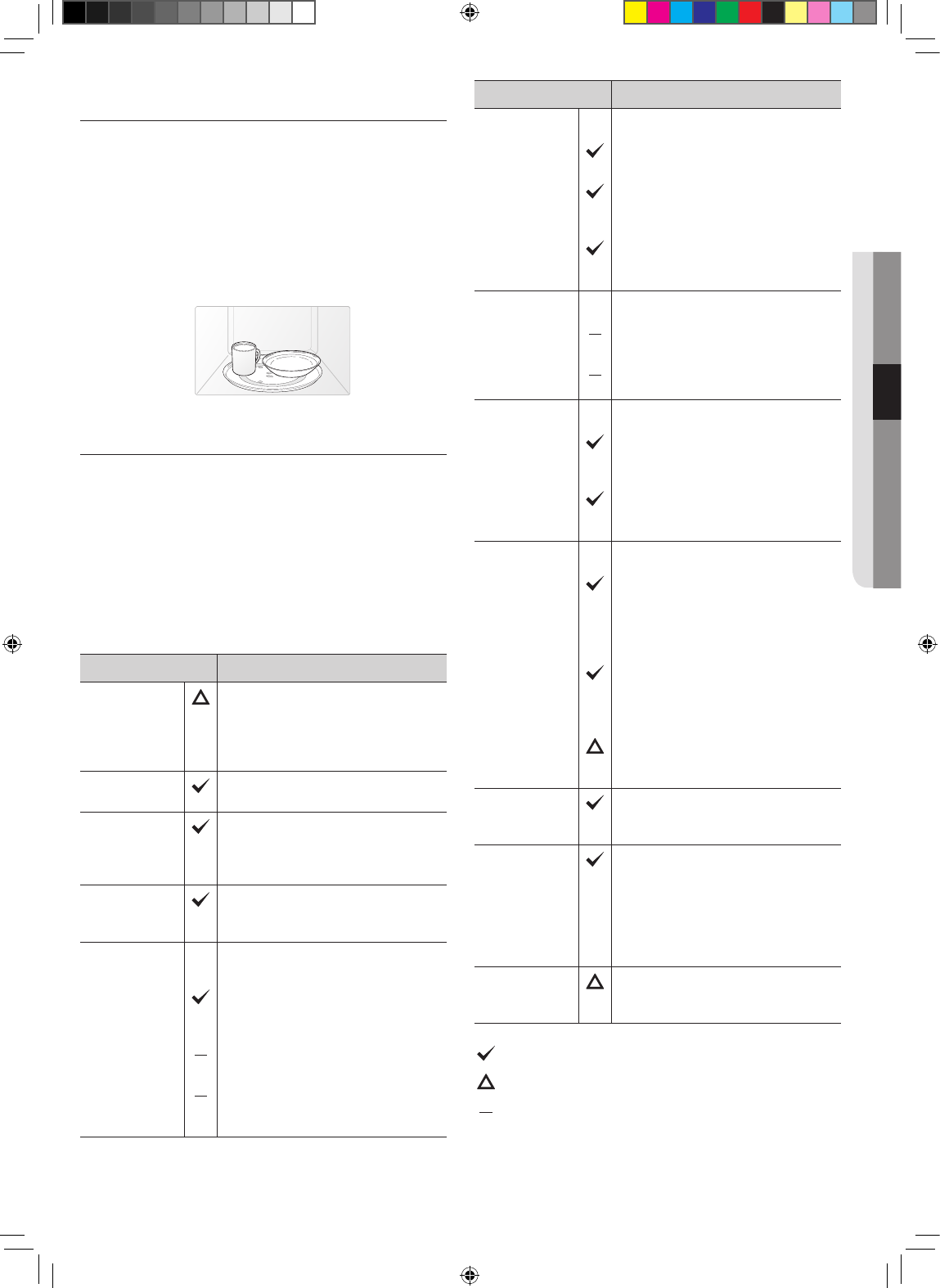
cookware guide _15
03 COOKWARE GUIDE
cookware guide
For food to cook in the microwave oven, the
microwaves must be able to penetrate the food
without being reflected or absorbed by the dish.
It is important to choose the correct cookware,
therefore, look for cookware that is marked
microwave-safe.
The following table lists various types of
cookware and indicates if and how they should
be used in a microwave oven.
MICROWAVE-SAFE UTENSILS
If you are not sure whether an item is microwave-safe or
not, you can perform the following simple test:
1. Place 1 cup of water (in a glass-measuring cup) inside
your oven next to the item to be tested.
2. Press the Add 30 Sec. button twice to heat them
both for one minute at high power.
After one minute, the water should be warm and the item
you are testing should be cool. If the dish is warm, then
it is absorbing microwave energy and is not microwave-
safe.
Cookware Comments
Aluminum foil Can be used in small quantities
to protect areas against
overcooking. Arcing can occur
if the foil is too close to the oven
wall or you use too much foil.
Browning
plate
Do not preheat for more than
eight minutes.
Ceramic,
porcelain,
and
stoneware
Porcelain, pottery, glazed
earthenware and bone china are
usually suitable, unless decorated
with a metal trim.
Disposable
polyester
cardboard
Some frozen foods are packaged
in these materials.
Fast-food
packaging
Polystyrene
cups/
containers
Can be used to warm food.
Overheating may cause the
polystyrene to melt.
Paper bags or
newspaper
May catch fire.
Recycled
paper or metal
trims
May cause arcing.
Cookware Comments
Glassware
Oven-to-table
ware
Can be used, unless decorated
with a metal trim.
Fine
glassware
Can be used to warm foods or
liquids. Delicate glass may break
or crack if heated suddenly.
Glass jars Regular glass is too thin to be
used in a microwave, and can
shatter.
Metal
Dishes,
Utensils
May cause arcing or fire.
Freezer bag
twist ties
May cause arcing or fire.
Paper
Plates, cups,
napkins and
kitchen paper
For short cooking times and
warming. Also to absorb excess
moisture.
Recycled
paper
Do not use recycled paper towels,
which may contain metal and may
catch fire or cause arcing.
Plastic
Containers Can be used if heat-resistant
thermoplastic. Some plastics
may warp or discolor at high
temperatures. Do not use
Melamine plastic.
Cling film Can be used to retain moisture.
Avoid wrapping the food too
tightly. Take care when removing
the film as hot steam will escape.
Freezer bags Only if boilable or oven-proof.
Should not be airtight. Pierce with
a fork if necessary.
Wax or
grease-proof
paper
Can be used to retain moisture
and prevent spattering.
Thermometer Use only those marked
“Microwave-safe” and follow the
directions. Check the temperature
in several places. You can use
conventional thermometers once
the food has been removed from
the oven.
Straw,
wicker, and
wood
Use only for short-term heating,
as these materials can be
flammable.
: Recommended to use
: Use with Caution
: Unsafe to use / Do not use
SMH1611_SMH1622_XAA_DE68-03898A_EN+MES.indb 15 2012-09-11 �� 9:46:18


















